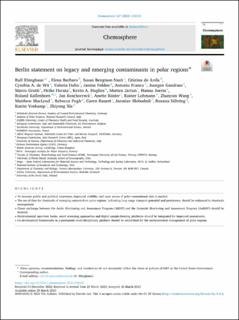Berlin statement on legacy and emerging contaminants in polar regions
| dc.contributor.author | Ebinghaus, Ralf | |
| dc.contributor.author | Barbaro, Elena | |
| dc.contributor.author | Bengtson Nash, Susan | |
| dc.contributor.author | de Avila, Cristina | |
| dc.contributor.author | De Wit, Cynthia A. | |
| dc.contributor.author | Dulio, Valeria | |
| dc.contributor.author | Felden, Janine | |
| dc.contributor.author | Franco, Antonio | |
| dc.contributor.author | Gandrass, Jürgen | |
| dc.contributor.author | Grotti, Marco | |
| dc.contributor.author | Herata, Heike | |
| dc.contributor.author | Hughes, Kevin A. | |
| dc.contributor.author | Jartun, Morten | |
| dc.contributor.author | Joerss, Hanna | |
| dc.contributor.author | Kallenborn, Roland | |
| dc.contributor.author | Koschorrek, Jan | |
| dc.contributor.author | Küster, Anette | |
| dc.contributor.author | Lohmann, Rainer | |
| dc.contributor.author | Wang, Zhanyun | |
| dc.contributor.author | MacLeod, Matthew | |
| dc.contributor.author | Pugh, Rbecca | |
| dc.contributor.author | Rauert, Caren | |
| dc.contributor.author | Slobodnik, Jaroslav | |
| dc.contributor.author | Sühring, Roxanna | |
| dc.contributor.author | Vorkamp, Katrin | |
| dc.contributor.author | Xie, Zhiyong | |
| dc.date.accessioned | 2023-09-21T13:28:01Z | |
| dc.date.available | 2023-09-21T13:28:01Z | |
| dc.date.created | 2023-04-03T15:10:59Z | |
| dc.date.issued | 2023 | |
| dc.identifier.citation | Chemosphere. 2023, 327, 138530. | en_US |
| dc.identifier.issn | 0045-6535 | |
| dc.identifier.uri | https://hdl.handle.net/11250/3091120 | |
| dc.description.abstract | Polar regions should be given greater consideration with respect to the monitoring, risk assessment, and management of potentially harmful chemicals, consistent with the requirements of the precautionary principle. Protecting the vulnerable polar environments requires (i) raising political and public awareness and (ii) restricting and preventing global missions of harmful chemicals at their sources. The Berlin Statement is the outcome of an international workshop with representatives of the European Commission, the Arctic Council, the Antarctic Treaty Consultative Meeting, the Stockholm Convention on Persistent Organic Pollutants (POPs), environmental specimen banks, and data centers, as well as scientists from various international research institutions. The statement addresses urgent chemical pollution issues in the polar regions and provides recommendations for improving screening, monitoring, risk assessment, research cooperation, and open data sharing to provide environmental policy makers and chemicals management decision-makers with relevant and reliable contaminant data to better protect the polar environments. The consensus reached at the workshop can be summarized in just two words: “Act now!” Specifically, “Act now!” to reduce the presence and impact of anthropogenic chemical pollution in polar regions by: • Establishing participatory co-development frameworks in a permanent multi-disciplinary platform for Arctic-Antarctic collaborations and establishing exchanges between the Arctic Monitoring and Assessment Program (AMAP) of the Arctic council and the Antarctic Monitoring and Assessment Program (AnMAP) of the Scientific Committee on Antarctic Research (SCAR) to increase the visibility and exchange of contaminant data and to support the development of harmonized monitoring programs. • Integrating environmental specimen banking, innovative screening approaches and archiving systems, to provide opportunities for improved assessment of contaminants to protect polar regions. | en_US |
| dc.language.iso | eng | en_US |
| dc.publisher | Elsevier | en_US |
| dc.rights | Navngivelse 4.0 Internasjonal | * |
| dc.rights.uri | http://creativecommons.org/licenses/by/4.0/deed.no | * |
| dc.title | Berlin statement on legacy and emerging contaminants in polar regions | en_US |
| dc.type | Peer reviewed | en_US |
| dc.type | Journal article | en_US |
| dc.description.version | publishedVersion | en_US |
| dc.rights.holder | © 2023 The Authors | en_US |
| dc.source.pagenumber | 7 | en_US |
| dc.source.volume | 327 | en_US |
| dc.source.journal | Chemosphere | en_US |
| dc.identifier.doi | 10.1016/j.chemosphere.2023.138530 | |
| dc.identifier.cristin | 2139267 | |
| dc.source.articlenumber | 138530 | en_US |
| cristin.ispublished | true | |
| cristin.fulltext | original | |
| cristin.qualitycode | 1 |
Tilhørende fil(er)
Denne innførselen finnes i følgende samling(er)
-
Publikasjoner fra Cristin - NIVA [2149]
-
Scientific publications [1172]

